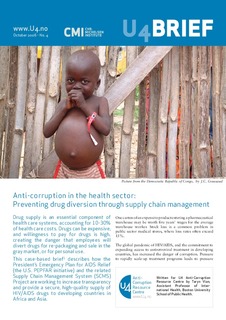| dc.contributor.author | Vian, Taryn | |
| dc.date.accessioned | 2018-01-04T08:15:53Z | |
| dc.date.available | 2018-01-04T08:15:53Z | |
| dc.date.issued | 2006-01-01 | |
| dc.identifier | oai:www.cmi.no:2569 | |
| dc.identifier.citation | Bergen: Chr. Michelsen Institute (U4 Brief 2006:4) | |
| dc.identifier.uri | http://hdl.handle.net/11250/2474555 | |
| dc.description.abstract | Drug supply is an essential component of health care systems, accounting for 10-30% of health care costs. Drugs can be expensive, and willingness to pay for drugs is high, creating the danger that employees will divert drugs for re-packaging and sale in the gray market, or for personal use. This case-based Brief describes how the President's Emergency Plan for AIDS Relief (the U.S. PEPFAR initiative) and the related Supply Chain Management System (SCMS) Project are working to increase transparency and provide a secure, high-quality supply of HIV/AIDS drugs to developing countries in Africa and Asia. | |
| dc.language.iso | eng | |
| dc.publisher | Chr. Michelsen Institute | |
| dc.relation | U4 Brief | |
| dc.relation | 2006:4 | |
| dc.relation.ispartof | U4 Brief | |
| dc.relation.ispartofseries | U4 Brief 2006:4 | |
| dc.relation.uri | https://www.cmi.no/publications/2569-anti-corruption-in-the-health-sector | |
| dc.subject | Corruption | |
| dc.subject | Health | |
| dc.subject | World | |
| dc.title | Anti-Corruption in the Health Sector: Preventing Drug Diversion through Supply Chain Management | |
| dc.type | Report | |
